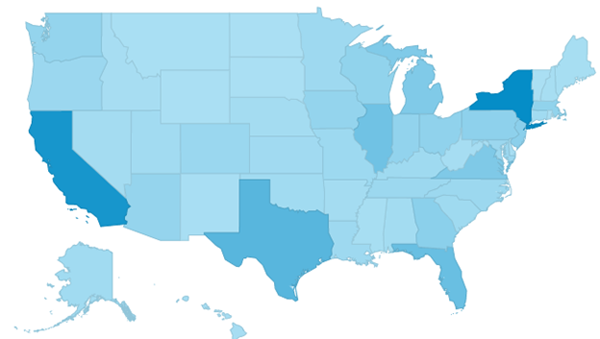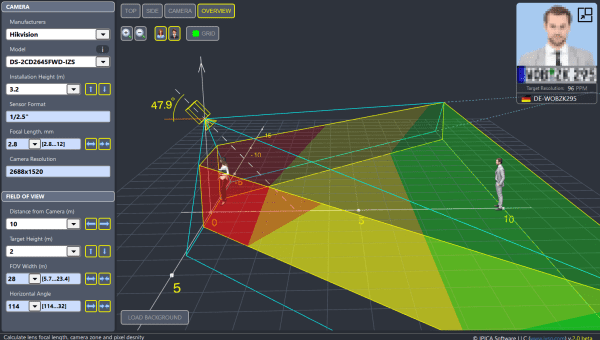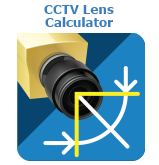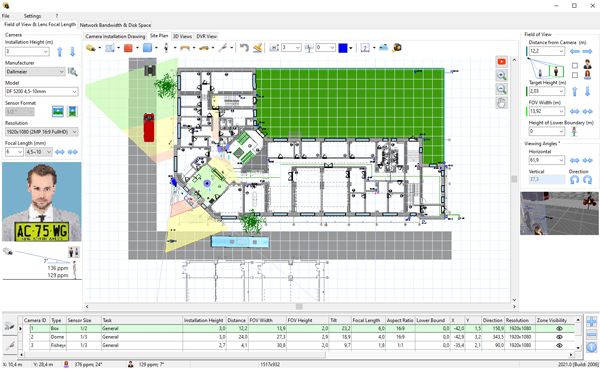Security Camera Installation License
In sheer number of surveillance cameras, the United States is among the world leaders. That’s why installing video surveillance in the United States is more relevant than ever. The difficulty for integrators is that quite a few states have differing laws. Therefore, many states have their own licensing requirements for the installation of burglar alarms, CCTV, electronic access control, that integrators must follow.
Because these requirements vary significantly from state to state, they can be difficult for novice video surveillance integrators and installers to navigate. This article will help you understand your state’s security licensing requirements.
Let’s take a look at how to lawfully install video surveillance.
Statistics on the use of the popular video surveillance software IP Video System Design Tool in the United States in 2021.

Statistics show that IP Video System Design Tool is especially popular in New York, California, Florida, Texas, and Illinois.
These statistics are generated by the percentage of users who leave the “Send anonymous usage statistics” option enabled when installing the program (on average, this ranges from 17% to 35%).
Download a trial version of the IP Video System Design Tool software and try finding optimal camera locations yourself.
Security Camera Installation License
Alabama

Integrators must obtain separate licenses to install burglar alarms, CCTV, or electronic access control in Alabama. License requirements are on the Alabama electronic security board of licensure website (AESBL).
In Alabama, installers must have biennial registration and pass a background check. Without an ID badge issued by the Alabama Electronic Security Board of Licensure by law, an installer cannot install/design a security system, burglar alarms, and so on.
In addition, installers must have proof of completion of the Nation Training School (NTS) course or an equivalent course to be licensed. For installers of security alarms, video surveillance systems, or electronic access control require different courses:
- for CCTV installers: The Video System Technologies course at NTS is a 14-hour online course.
- for burglar alarm installers: Certified Alarm Technician course at NTS is a 22-hour online course.
- for electronic access control installers: Electronic Access Control 22-hour online course at NTS, ALOA electronic access control class 2 day class, or Certified Alarm Technician Level 1 course at NTS (length: 22 hours).
Each company installing a burglar alarm, CCTV, or access control must provide AESBL with a general liability insurance policy certificate of at least $250,000.
Alaska
No license is required to install security cameras in Alaska.
Arizona

Arizona Registrar of contractors requires qualifying agents of a company to be licensed to install a video surveillance system.
Low Voltage License Arizona
A qualified agent to obtain a license to install CCTV must pass two exams in Low Voltage Communication Systems:
- business management exam
- technical exam
Arizona requires all CCTV companies employees to submit to a criminal background check and register with the State of Arizona Board of Technical Registration.
Arkansas
Arkansas Alarm License
The Arkansas State Police regulate CCTV and burglar alarms companies. According to state law, all video surveillance installers must have a license.
CCTV installers are required to complete the Certified Alarm Technician Level I training (22-hour online course) and pass a background check. Qualified agents must also be trained in Advanced Intrusion Systems and Fire Alarm Installation Methods. Both online courses last 14 hours each.
Any company that sells, installs, inspects alarm systems, fire alarm systems, or video surveillance systems must be licensed as an alarm system company.
For more information on licensing in Arkansas, you can visit The Official Website of the State of Arkansas in the Arkansas Department of Public Safety section.
California

Do I need a license to install security cameras in California?
California requires a state contractors’ license to install video surveillance. The California Contractors State License Board gives contractors a license number and requires them to list it wherever the company name or logo appears.
The qualifying agent must obtain a Low Voltage Systems (C-7) license for CCTV design and a Lock and Security Equipment license (C-28) to install electronic access control. The exams for these licenses are multiple-choice exams, with four answer choices for each question.
In California, all security company employees must pass a criminal history background check through the California Department of Justice and the FBI. Qualifying agents must have two years of paid experience installing burglar alarms or video surveillance systems and pass an examination on California law.
California penal code video surveillance
California’s laws governing the legality of secretly recording conversations are the toughest in the USA. Penal Code 632 prohibits observation or recording of confidential communications without the consent of all parties involved.
Colorado
No license is required to install security cameras in Colorado.
Connecticut
Connecticut Department of Consumer Protection requires professional licensing for electrical trades.
In Connecticut, the CCTV installer must take the CT L5 Limited Electrical exam and have two years of documented experience. The exam consists of two parts CT Contractor Business and Law (120 minutes) and L-5 TRADE (90 minutes).
Delaware
The Delaware State Police requires that anyone who sells, services, installs, or monitors video surveillance systems be licensed.
CCTV companies must register and pay the deposit. CCTV installers must have an ID card to be a valid employee, pass a background check and have no criminal record for a felony or other disqualifying offense.
District of Columbia
A licensed master electrician may apply for a separate license to install alarms as a qualified agent.
Video surveillance installers must pass a background check and have a document certifying that they will be working as a qualified agent.
Read more about Security and Fire Alarm Systems Regulations
Florida

Do I need a license to install security cameras in Florida
Installing video surveillance cameras in Florida without a license is illegal. To legally install video surveillance, you must pass the Certified Alarm Systems Contractor I exam as well as the test on Florida state law and safety. After the exam, the agent must also file a credit report with a positive net worth, along with a company financial report with a net worth of at least $10,000.
If you have six years of trade experience, you can pass the Certified Alarm Systems Contractor II exam.
Visit the Department of Business and Professional Regulation State of Florida website to learn more about license requirements.
Georgia
Georgia Low Voltage License
The state of Georgia requires that a qualified CCTV installer has a Low Voltage License.
There are 4 low voltage contractors licensure examinations:
- General (LVG)
- Telecommunications (LVT)
- Alarms (LVA)
- Unrestricted (LVU)
To pass the exam, a qualified agent must have at least one year of experience with low voltage wiring in the license category for which the applicant is applying.
The license also requires passing the Georgia Business and Law Examination, passing a background check, and providing three letters of recommendation.
Hawaii

The official Department of Commerce and Consumer Affairs website says in a section Professional & Vocational Licensing Division that a qualified agent must obtain a license to install burglar alarms.
In Hawaii, video surveillance companies are not required to obtain a license. Still, Hawaii law requires individuals and companies that sell, service, and install video surveillance systems to maintain a $5,000 surety bond for the first five years of operation in the state of Hawaii. Injured and injured parties can sue on this bond.
Idaho
There are the following types of licenses in Idaho:
- Specialty Electrical Contractor’s License
- Specialty Journeyman License
Qualified agents must pass the license exam and have at least two years of experience in the field. CCTV Companies must also show proof of insurance. Trainees must also register with the state of Idaho.
You can read more about the video surveillance installation license on the Idaho Official Government Website in a section of the Division of Occupational and Professional Licenses.
Illinois
Any firm installing or servicing fire and security alarm systems in Illinois must be licensed. Qualified agents must have three years of experience in the field they want to be licensed, pass the private alarm contractor licensure exam, and pass a background check.
More about private alarm contractor licensure examination information you can read here: Private Alarm Contractor Licensure Examination Information
Indiana
No license is required to install security cameras in Indiana.
Note: Most municipalities in Indiana require a contractor’s license. Some municipalities license low-voltage work.
Iowa
In Iowa, installers are required to have a license to install video surveillance or alarm system. Installers must pass the NTS Level I exam (online courses last 22 hours). Also, employees of alarm/surveillance installation companies must pass a background check.
Kansas
No license is required to install security cameras in Kansas.
Kentucky
No license is required to install security cameras in Kentucky.
Note: Although installers of low-voltage telecommunications systems are exempt from licensing, there is a separate license for fire alarm systems.
Lousiana

Video surveillance installers in Louisiana need to get a license.
There are several types of licenses in Louisiana:
- Type A. Full Burglar Alarm, Access Control, and CCTV
- Type A-2. Install locks, CCTV, and electronic access control.
- Type A-4. CCTV Alarm System Contractor
Type A allows the holder to install Burglar Alarm, Access Control, and CCTV.
Subtypes of type A:
- B: Technician (qualified agent)
- C: Installer (Installer working under the supervision of type B. NTS level I (online courses last 22 hours)certification required)
- D: Apprentice (no certification required)
- D-T: Temporary Apprentice (expires after 30 days)
- E: Salespeople
Type A-2 allows the holder to install locks, CCTV, and electronic access control.
Subtypes of type A-2:
- Type I: Technician
- Type K: Apprentice (works under the supervision of Type I)
Type A-4 allows the holder to install video surveillance systems only.
To obtain a Type A-4 license, a CCTV worker must take the NTS Video Systems Technology course or Video Security Systems Essentials ( VSSE ) course. The VSSE course covers the basics of CCTV installation and the latest technology in CCTV, including networking technology, IP cameras, and HD CCTV.
For more information, visit the Louisiana Department of Public Safety and Corrections website.
Maine
Maine has the following types of licenses for Limited Electrician in Low Energy:
- Fire Alarms
- Low-energy electronics
- Low-voltage landscape lighting
Installers wishing to take the limited low-energy license exam must have completed 270 hours of training in electrical engineering and have 4,000 hours of experience in the field.
Read more about the Electricians’ Examination Board on the Maine Department of Professional and Financial Regulation website.
Maryland
The State Board of Master Electricians in Maryland issues only one license: Master Electrician.
A person who applies for a license must pass a background check and have good moral character, reputation and qualifications and must also present an insurance certificate.
Note: In Maryland, many municipalities require a municipality license to perform electrical work.
Massachusetts

Types of licenses in the state of Massachusetts:
- Systems Contractor
- Systems Technician
Installers in Massachusetts are required to pass a background check.
To be licensed as a systems technician, you must pass the exam and have 300 hours of classroom training and 4,000 hours of experience before you can take the exam. The systems technician may work as an individual, supervising no more than one apprentice.
A systems technician with at least one year of experience and 75 hours of classroom instruction may pass the systems contractor exam. A systems contractor may work as a qualified agent, supervising systems technicians and apprentices.
To learn more, visit the official website of the Commonwealth of Massachusetts.
Michigan

Types of licenses in the state of Michigan:
- Systems Contractor (includes fire alarm and security)
- Systems Technician
Qualified agents of alarm installation companies must pass a background check, have a bond, and have worked for an alarm installation company in a management position for a minimum of four years before applying for an alarm contractor’s license.
To learn more, visit the official website of the Department of Licensing and Regulatory Affairs of Michigan.
Minnesota

Types of licenses in the state of Minnesota:
Alarm companies installing burglar alarms must hold a Technology Systems Contractor license. Qualifying agents in Minnesota must have a Power Limited Technician license.
Read more about Minnesota Administrative Rules
Mississippi
Mississippi requires installers of burglar alarms, video surveillance, or access control systems to be licensed. There are the following types of licenses:
- Class A. A Class A license will allow a company to engage in any alarm installation. To obtain a Class A license, a company or individual must have a Mississippi work permit, have proof of liability insurance over $300,000, and workers’ compensation insurance. All employees must pass a background check and not be convicted of a felony, and the company must have at least one employee with a Class B license.
- Class B. Class B licenses are for system technicians and apply to most alarm and surveillance systems. Each Class A license holder must hire a minimum of one Class B licensee. Candidates must have completed the National Burglar and Fire Alarm Association (NBFAA) Level 2 security alarm training and reside within 150 miles of the office in which they work. You must also pass a background check to obtain a license.
- Class C. Class C licenses are for system installers who have completed the Level 1 Burglar Alarm training course. The system installer must also pass a background check to obtain a license.
- Class D. Class D licenses are required for salespeople. Salespeople must have completed the NBFAA Sales Understanding Alarms course and have a minimum of two years of experience designing and/or selling systems. Salespeople must also pass a background check.
- Class H. Class H licenses are for apprentices. Apprentices, as well as installers, need to pass a background check. This license allows apprentices to work under the supervision of system technicians with a Class B license or system installers with a Class C license.
Read more about Mississippi Electronic Protection Systems
Missouri
No license is required to install security cameras in Missouri.
Montana
Montana requires an alarm installer license. Alarm installers must submit a background check to obtain a license, and alarm companies must show proof of insurance.
Read more about Professional Boards & Licensing at the official Montana Department of Labor and Industry website.
Nebraska
No license is required to install security cameras in Nebraska.
Nevada
To install CCTV in Nevada, an integrator must have C-2d-Low Voltage Systems, have a minimum of 4 years of experience, pass a business law exam, and pass a technical exam. In addition to the above, the candidate must post a bond and present current financial statements to be licensed.
In addition to the C-2d license in Nevada, there are different types of licenses for contractors to engage in some professional security activity:
- C2-Electrical Contractor
- C2C-Fire Detection
- C2E-Signal Systems
- C-2d-Low Voltage Systems
- C-2h-Photovoltaics
- C41-Fire Protection
- C41C-Fire Alarms
Read more about Nevada State Contractors Board
New Hampshire
No license is required to install security cameras in New Hampshire.
New Jersey
New Jersey law requires a license to install video surveillance, burglar alarms, or electronic access control systems.
A qualified agent must have at least four years of experience plus 80 hours of technical courses to be licensed. He must pass a business and law exam, a technical exam, and pass a background check.
New Jersey-based businesses in the security industry must maintain an insurance and surety bond. Companies are also required to have a 24-hour emergency service phone number.
Read more about Fire Alarm, Burglar Alarm, and Locksmith Advisory Committee in New Jersey.
New Mexico
New Mexico integrators to install security or fire alarm systems require an ES-3: Sound and Intercommunication and Electrical Alarm Systems license. To get it, you must have at least two years of experience, pass an exam, and pass a background check and surety bond.
New York

In New York City, no one can install a burglar alarm, video surveillance, or electronic access control system without a state license.
To get a license, you have to go through several steps, first completing 81 hours of training, second passing a background check, and third applying for a license.
In New York City, the IP Video System Design Tool video surveillance software is especially popular. Many licensed NYC video surveillance installers prefer to create their designs with maximum facility security through simple 2D and 3D modeling. These professional-looking designs help you win the video surveillance design competition and get the job.
North Carolina
A qualified agent working with a burglar alarm or video surveillance system must be licensed by North Carolina.
A qualified agent must have a minimum of two years of experience or have completed the Certified Alarm Technician Level I course to be licensed. In addition, the agent must provide references and pass a background check.
There is also a Low Voltage (SP-LV) license in North Carolina.
More information about Low Voltage, SP-LV license read at the NC State Board of Examiners of Electrical Contractors website
Note: The Certified Alarm Technician Level I course must be explicitly taken under the auspices of the North Carolina Electronic Safety Association, as courses taken in other states will not be accepted.
North Dakota
No license is required to install security cameras in North Dakota.
Ohio
No license is required to install security cameras in Ohio.
Oklahoma
Oklahoma Alarm License
An integrator to install video surveillance, electronic access control, or security alarm systems must obtain Oklahoma Alarm License.
Types of licenses in the state of Oklahoma:
- License Burglar Alarm Technician
- License Burglar Alarm Sales
- License Fire Alarm Technician
- License Fire Alarm Sales
- License Alarm Company
- License Alarm Company Manager
To qualify for a License Alarm Company Manager or Qualified Agent license, you must have a minimum of four years of experience, two of which have been as a licensed technician, and pass a technical exam and background check. License Alarm Company Manager can supervise technicians and trainees. Every company with a License Alarm Company must hire a License Alarm Company Manager.
To be licensed as a Technician, you must pass an exam and pass a background check.
A person intending to work as a trainee or a salesperson must pass a background check and only work under the supervision of a licensed technician or manager.
Oregon
In Oregon, a license is required to install a burglar alarm system. A license can be obtained by installers who have worked as apprentices in the state for at least three years or who have done similar work in other states. They must also pass a background check and pass an exam.
For more information, visit the Official Oregon Website
Pennsylvania
No license is required to install security cameras in Pennsylvania.
Rhode Island

In Rhode Island, you cannot install, service, or sell burglar alarms without a license.
In Rhode Island, there are the following types of licenses:
- Master Alarm Electrician
- Journeyman Alarm Electrician
- Telecommunication System Contractor
- Telecommunications System Technician
- Telecommunication System Limited Installer
- Telecommunication System Limited Installer
To obtain any of the licenses listed above, you must pass a background check and provide personal references.
Alarm installation companies in Rhode Island must have a bond and provide service 24 hours a day.
South Carolina
The following types of licenses exist in South Carolina:
- Burglar and Fire Alarm Business
- Burglar Alarm Contractor
A background check, exam, and proof of insurance and collateral are required to obtain a license.
South Dakota
No license is required to install security cameras in South Dakota.
Tennessee
The state of Tennessee requires a license for any installer who works with a burglar alarm or video surveillance system.
The state of Tennessee has the following types of licenses:
- Low Voltage license Tennessee
- Low Voltage work (Less than 70 volts)
- Fire detection
- Alarm systems Contractors
You do not need to take an exam to do low voltage work (less than 70 volts), but you must register with the Tennessee Alarm Contractors Board.
Since the state requires separate licenses for installing burglar alarms and video surveillance, you need to specify which you need or apply for both licenses at once.
Companies must obtain an Alarm Systems Contractor Company license, and all employees must pass a background check.
Qualified agents must be licensed as an Alarm Qualifying Agent.
Texas

Do you need a license to install security cameras in Texas
In Texas, it is a crime to contract to install surveillance cameras without a license issued by the Texas Private Security Bureau, a Division Of The Texas Department Of Public Safety.
In Texas, an installer or company that handles burglar alarms, video surveillance, or electronic access control must be licensed.
Qualified agents must pass two exams: the technical exam and the Texas code exam.
Installers must pass the Certified Alarm Technician Level I exam to be licensed.
Utah
In Utah, it is required to have a license to install a burglar alarm. In addition to the license, the company has to have proof of insurance, and the employees have to pass a background check.
Types of licenses in Utah:
- Burglar Alarm Company
- Burglar Alarm Company Agent
- Burglar Alarm Company Qualifier
To qualify for a Burglar Alarm Company Qualifier license, you must have a minimum of three years of experience in alarm installation, one of which is in a supervisory position. In addition to the Burglar Alarm Company Qualifier Examination, one must pass the Utah Burglar Alarm Law and Rule Examination.
To be licensed as a Burglar Alarm Company Agent, you must pass the Certified Alarm Technician Level 1 exam (22-hour course). This type of license is required for all alarm installers, vendors, and anyone who has access to alarm information.
Vermont
In Vermont, it is necessary to obtain a G7-k electrician’s license to install electronic access control.
Read more about Trade Licensing and Certifications at the Official Vermont Government Website.
Virginia
Virginia Alarm License
In Virginia, it is required to have a license to install a burglar alarm, video surveillance system, or electronic access control and pass a background check. Electronic security technicians to install a burglar alarm or CCTV must complete 14 hours of state-approved training, assistant electronic security technicians must complete 4 hours, and electronic security sales representatives must complete 8 hours of training.
Read more at the official Virginia Department of Criminal Justice Services website.
Washington

In Washington, companies that install burglar alarms must be licensed.
To be licensed, a qualified agent must have a minimum of 4 years of experience and 48 hours of classroom training in Washington State.
West Virginia
In West Virginia, companies installing security alarms must be licensed.
Qualifying agents with 4 000 hours or two years of experience in fire and burglar alarms may apply to take a Specialty Electrician license with a classification in Fire/Burglar Alarm (low voltage).
Wisconsin
No license is required to install security cameras in Wisconsin.
Wyoming
Qualified agents with more than 3,000 hours of experience can take the Low Voltage Alarm Technician (LV-A) exam.
Types of licenses in Wyoming:
- Low Voltage Technician
- Low Voltage Contractor
- Low Voltage Apprentice Technician
Read more at the official Wyoming Dept of Fire Prevention and Electrical Safety
It should be noted that during a pandemic, many states may impose temporary rules for obtaining a license. Installers should be sure to check state licensing requirements on official state websites to be aware of possible changes. Also, some states without state licensing requirements have municipalities that impose their own regulations on video surveillance installers.
Free CCTV Lens Calculator with 3D graphics, DORI Zones and correct horizontal angles.






